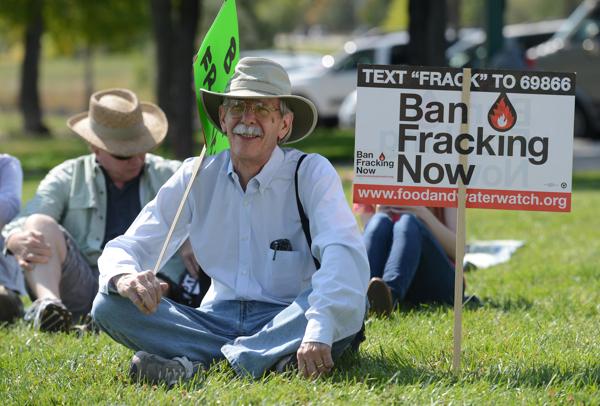Legal costs
Costs incurred defending fracking bans from legal challenges:
Longmont (since November 2012): $61,152
Lafayette (between December 2013 and March 20): $24,384
Broomfield (since November 2013): $23,400
Costs incurred legally defending oil and gas regulations:
Longmont (since summer 2013): $163,660
Costs incurred drafting oil and gas regulations and fracking bans in 2013:
Broomfield: $37,182
Boulder: $2,494
Total: $312,272
Sources: Municipal records from Longmont, Lafayette, Broomfield and Boulder
Since residents of Longmont, Broomfield and Lafayette voted to ban fracking within their borders, the three cities have combined to spend $108,936 defending the measures from legal challenges, officials say.
And that is just a fraction of the money those towns, along with the city of Boulder, have invested in crafting regulations governing the controversial natural gas extraction process and attempting to exert local control over it.
When factoring in costs of drafting strict guidelines to manage oil and gas extraction, plus defending legal challenges to those regulations, Longmont, Broomfield, Lafayette and Boulder have spent $312,272 on fracking-related legal expenses, according to officials, a number that is increasing.
But fracking ban advocates say legal fees are nothing compared to the costs their communities would incur allowing the process to continue unchecked.
"What is not being accounted for is the potential lost property values," said Lafayette resident Cliff Willmeng, who help lead the charge against fracking through his group East Boulder County United. "If all the homes in Lafayette lose $10,000 in value through their accommodation of oil and gas development, we're talking a sum that is exponentially larger than the fraction of money that is being spent to defend our fundamental community rights."
Lafayette
Sixty percent of Lafayette voters in November supported a measure that prohibits any new oil and gas extraction in the city.
Within a month, the Colorado Oil & Gas Association, which represents industry interests in the state, filed a lawsuit against Lafayette seeking to negate the ban.
In a statement issued at the time, the association said the ban violates state law because "state regulations specify and the state Supreme Court has ruled that oil and gas development, which must employ hydraulic fracturing or fracking, supersedes local laws and cannot be banned."
As of March 20, Lafayette had paid $24,384 for legal services related to the COGA suit, according to city records. The money has been paid out to Lafayette's general legal counsel, Williamson & Hayashi LLC, and an outside firm, Kissinger & Fellman P.C., brought in specifically to help defend the fracking ban. Additional bills are expected to be received and paid out by the city in the next few weeks.
"The funding is needed to address immediate needs, so it's being pulled from our reserve fund," city spokeswoman Debbie Wilmot said.
COGA recently filed a motion for summary judgment in the case, and the city's lawyers this week have been preparing a response to that request, said attorney Dave Williamson. A trial has been scheduled for Feb. 23 in Boulder District Court, he said.
Longmont
Longmont voters threw their support behind a fracking ban in 2012 and quickly drew a lawsuit from COGA. As of the end of April, the city had drawn $61,152 from its general liability insurance fund to combat the suit, Longmont spokesman Rigo Leal said.
That comes in addition to $163,660 in insurance funds Longmont has spent fighting a lawsuit brought against the city in the summer of 2012 by the Colorado Oil and Gas Conservation Commission, the state regulatory agency, after the Longmont City Council passed regulations restricting oil and gas drilling in residential areas.
Boulder District Court Judge D.D. Mallard on April 22 granted a stay in the state's case against Longmont until the COGA suit can be resolved. The Colorado Oil and Gas Conservation Commission has been added as a plaintiff in the fracking ban suit, which is making its way through the court system. A trial date has not been set.
Kaye Fissinger — executive director of "Our Health, Our Future, Our Longmont," the group behind getting the fracking ban on the city's 2012 ballot — said allowing fracking incurs expenses for taxpayers, individuals and businesses.
"The externalized costs are rarely, if ever, mentioned," Fissinger said. "These costs, such as road repair or rebuilding, are costs borne by the taxpayers at all levels of government. There are health care costs borne by individuals; insurance disbursements and premiums paid by businesses and individuals; lost work due to illnesses attributed to proximity to drilling, fracking and producing wells."
Broomfield
The passage of a five-year fracking ban in Broomfield last year was controversial from the start, winning by just 20 votes and drawing a legal challenge related to election flaws that landed it in 17th Judicial District Court.
Judge Chris Melonakis in February upheld the results of the election, but not before Broomfield spent $23,400 on legal defense, according to City and County Attorney Bill Tuthill.
That comes on top of $37,182 Broomfield spent on outside legal and engineering advice it used when crafting new, stricter oil and gas regulations in the summer of 2013.
Oil and gas company Sovereign also filed suit late last month against Broomfield, seeking to be exempted from the fracking ban so that it can drill wells it had planned for since last year.
Tuthill said at this point he does not plan to retain outside counsel or outside experts in the Sovereign suit.
Boulder
Boulder also approved a five-year extension on its fracking moratorium in November, but the city has so far not been subject to a lawsuit. The city spent $2,494 researching regulatory steps it could take in regards to oil and gas development within its borders, according to the City Attorney's Office.
Efforts to further increase municipalities' authority over fracking and oil and gas development are underway as well. Members of a group called the Boulder County Community Rights Network have recently met with the Boulder County commissioners and urged them to adopt a home-rule charter they feel will give the county stronger legal footing to ban fracking.
'Quick political points'
Randy Hildreth is the Colorado director of Energy in Depth, a research, education and public outreach campaign organized through the Independent Petroleum Association of America. He said the national activism groups that led many local anti-fracking campaigns last year are well funded but don't care to support communities affected by the bans once the laws have been adopted.
"The local ban-fracking campaigns were actually run by Food and Water Watch and other national activist groups with millions of dollars at their disposal," Hildreth said. "They used these cities and towns to score some quick political points, but they've already moved on to their real goal — banning oil and gas development across the state of Colorado. They are more interested in raising money from ultra-rich activists, like Tom Steyer and Congressman Jared Polis, than the legal bills of these cities or the tens of thousands of jobs that are threatened by their statewide anti-energy campaign."
Contact Camera Staff Writer Joe Rubino at 303-473-1328 or rubinoj@dailycamera.com.


 Font Resize
Font Resize







